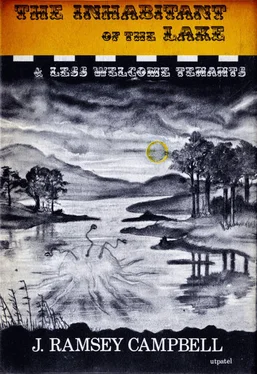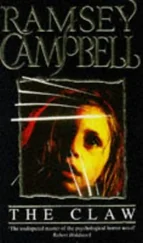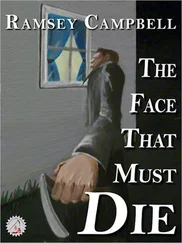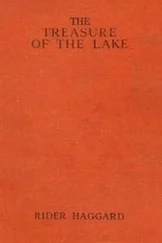Nor was this all Chesterton heard recounted when he arrived. He had not yet seen the horribly incomplete remains of Phipps, nor that other object which lay in shadow some distance away, for the crowd was being skilfully directed away from the two monstrosities by a surprisingly sane three men — the same ones who had been partly responsible for their destruction. Now, however, the three, sensing his instinctive authoritative bearing, converged on him and began to recount their terrible experience, supplementing their account by pointing out the remains of Phipps and his dreadful companion. Even though Chesterton had formed a good idea of the appearance of the river creatures, he could not suppress a gasp of revulsion as the being was revealed. The sketch and the Necronomicon illustration had not reproduced everything; they had not shown the transparency-of the half-gelatinous flesh, revealing the mobile organs beneath the skin. Nor had they shown the globular organ above the brain, at whose use Chesterton could only guess shudderingly. And as the mouth fell open when they stirred the body, he saw that the being possessed no teeth, but six rows of powerful tentacles interlaced across the opening of the throat.
Chesterton turned away, nauseated by this concrete symbol of cosmic alienage, to move back and speak to one or two of the affrighted crowd, who had no idea of what lay nearby. He twisted around again as a choking cry of horror came behind him; and, under the fast-sinking moon, he saw one of the three men struggling with the tentacles of the river monster. It stood semi-erect on its four lower legs, and was dragging the man towards the yearning members about the mouth. The globular device in the head was pulsing and passing through shocking metamorphoses, and even in this position, Chesterton noticed that the river had momentarily washed almost to the edge of the crowd, and the water was being levitated into an orifice in the head above the globe.
The distance between the wide-gaping mouth and the victim was momently lessening, while the companions of the man were standing seemingly paralysed with terror. Chesterton snatched a rifle from the hands of one of them, aimed it, and stood temporarily uncertain. Recollecting that the being had only been put out of action by the other bullet because of his own incantation, Chesterton doubted whether another shot would harm it. Then, as he saw that pulsing sphere in the head, a conjecture formed in his mind; and he aimed the weapon at the organ, hesitating, and pulled the trigger.
There was a moist explosion, and the watchers were spattered with a noisome pulp. They saw the being sink to the ground, its legs jerking in spasmodic agony. And then came an occurrence which Chesterton would not write about, saying only that very soon almost no remains of the monstrosity existed.
And, as if they had reacted in delayed fashion to the destruction of the being, the crowd now shrieked in unity of terror. Chesterton saw before he turned that the intended victim was indeed dead, whether from pure terror or from the embrace of the tentacles — for where these had gripped, the man's flesh was exposed. Then he turned to look where the mob was staring, and as they too stared in that direction, his two companions remembered what they had seen heading for the town in those recent lunatic minutes.
The moon had sunk nearly to the horizon, and its pallid rays lit up the roofs of the Clotton houses behind which it hung. The chimneys stood up like black rooftop monoliths, and so did something else on one of the nearer roofs — something which moved. It stumbled on the insecure surface, and, raising its head to the moon, seemed to be staring defiantly at the watchers. Then it leapt down on the opposite side, and was gone.
The action was a signal to the waiting crowd. They had seen enough horrors for one night, and they fled along the riverside path which, dangerous as it was, seemed more secure than any other means of escape. Chesterton watched as the lights faded along the black river, and then a hand touched his arm.
He turned. The two remaining members of the party which had killed Phipps stood there, and one awkwardly said: 'Look, you said you wanted t' destroy them things from the river, an' there's still one left. It was them did for Frank here, an' we think it's our — duty — to get 'em for 'im. We don't know what they are, but they went an' killed Frank, so we're bloody well goin' to try an' kill them. So we thought that if you needed any help with killin' that last one…'
'Well, I told you something of what I know,' Chesterton said, 'but — well, I hope I won't offend you, but — you must understand certain things pretty thoroughly, to unite your wills with mine, and I don't know whether you'd — What sort of work do you do anyway?'
'We're at Poole's Builder's Yard in Brichester,' one told him.
Chesterton was silent for so long that they wondered what had occurred to him. When he looked at them again, there was a new expression in his eyes. 'I suppose I could teach you a little of the Yr-Nhhngr basics — it would need weeks to get you to visualise dimensional projections, but maybe that won't be necessary if I can just give you a copy of the incantation, the correct pronunciation, and give you the lenses for the reversed-angle view of matter if I can make any in time — yes, those plain glass spectacles would do if I put a filter over to progress the colours halfway… But you don't know what the devil I'm running on about. Come on — I'll drive you to my house.'
When they were driving down the A38, Chesterton broke the silence again: 'I'll be frank — it was really because you work at Poole's that I accepted your aid. Not that I wouldn't be glad of help — it's a strain to use those other parts of the brain with only your own vitality to draw on — but there's so much I have to teach you, and only tonight to do it in; there wouldn't even be tonight, but it's crazy to attack while it's dark. No, I think I can use you more in another way, though perhaps you can help with the chant. So long as I still have the reproduction of that seal in the river… and so long as you can get used to artificial reversal of matter — I always do it without artificial help, because then it doesn't seem so odd.'
And as he drew up the car in the driveway off Bold Street, he called back: 'Pray it stays near water to accustom itself to surface conditions. If it doesn't — they're parthenogenetic, all of them, and pretty soon there'll be a new race to clear off the earth. Humanity will just cease to exist.'
IV
The next day was one of sickly-glowing sunlight and impending winds. Chesterton had copied out the formula in triplicate and given a copy to each of the men, retaining one for himself. Now, in mid-morning, the librarian and one of his helpers were going through the streets of Clotton, gradually approaching the riverside section. On the bank waited the third of the party, like his friend wearing the strange glasses which Chesterton had prepared the night before; his was the crucial part of the plan. The riverbank was otherwise bare — the human corpse and the others having been disposed of.
Chesterton concentrated on his formula, awaiting the finding of what he knew lurked somewhere among the deserted red-brick houses. Strangely, he felt little fear at the knowledge that the amphibian terror lurked nearby, as though he were an instrument of greater, more elemental forces. At the conclusion of the affair, upon comparing impressions, he found that his two companions had been affected by very similar feelings; further, he discovered that all three had shared a vision — a strange mental apparition of a luminous star-shaped object, eternally rising from an abyss where living darkness crawled.
Abruptly a gigantic shape flopped out of a side street, giving forth a deafening, half-intelligent croaking at the sight of the two men. It began to retrace its journey as Chesterton's accomplice started to chant the incantation; but Chesterton was already waiting some yards down the side street, and was commencing the formula himself. It gave a gibbering ululation and fled in the direction of the river, where the two followed it, never ceasing their chant. They were slowly driving it towards the riverbank — and what waited there.
Читать дальше












